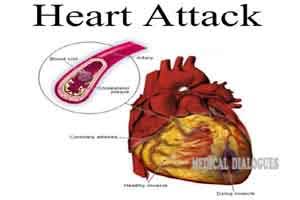- Home
- Editorial
- News
- Practice Guidelines
- Anesthesiology Guidelines
- Cancer Guidelines
- Cardiac Sciences Guidelines
- Critical Care Guidelines
- Dentistry Guidelines
- Dermatology Guidelines
- Diabetes and Endo Guidelines
- Diagnostics Guidelines
- ENT Guidelines
- Featured Practice Guidelines
- Gastroenterology Guidelines
- Geriatrics Guidelines
- Medicine Guidelines
- Nephrology Guidelines
- Neurosciences Guidelines
- Obs and Gynae Guidelines
- Ophthalmology Guidelines
- Orthopaedics Guidelines
- Paediatrics Guidelines
- Psychiatry Guidelines
- Pulmonology Guidelines
- Radiology Guidelines
- Surgery Guidelines
- Urology Guidelines
Diabetes drug may help rebuild body after heart attack

A common drug used by diabetes patients to prevent heart disease can be used to aid recovery from a heart attack, reveals a new study.
Metformin is a cost-efficient drug that is usually used as a first-line treatment in Type 2 diabetes as it helps to make the body more responsive to insulin.
Metformin enhances the physiological process through which new blood vessels form, that is essential for heart attack recovery, the findings showed.
Also, metformin affects several new genes important in promoting the growth of new blood vessels, the study said.
Lack of oxygen in the presence of high glucose levels - as occurs during a heart attack in diabetes - delays blood vessel formation whilst metformin reverses that process, the research said.
"Our research is exciting as it can instantly make a difference to the treatments we are exploring, offering a new approach to heart disease in diabetes and new therapies may now be developed," said Jolanta Weaver, senior lecturer at Newcastle University in Tyne, Britain.
Experts used stem cells from cord blood and cells from umbilical cord to construct a model simulating a heart attack in a lab.
The researchers hoped that the study, published in the journal Cardiovascular Diabetology, might lead to new drugs, as not all diabetic patients can take metformin, as it has now provided a better understanding of the action of the medication.
Heart disease is the leading cause of illness in diabetic patients. Recent reports from the International Diabetes Federation highlight that 8.3 percent of adults have diabetes, affecting 382 million people worldwide. It is estimated that this number will rise to 592 million by 2035.
Metformin is a cost-efficient drug that is usually used as a first-line treatment in Type 2 diabetes as it helps to make the body more responsive to insulin.
Metformin enhances the physiological process through which new blood vessels form, that is essential for heart attack recovery, the findings showed.
Also, metformin affects several new genes important in promoting the growth of new blood vessels, the study said.
Lack of oxygen in the presence of high glucose levels - as occurs during a heart attack in diabetes - delays blood vessel formation whilst metformin reverses that process, the research said.
"Our research is exciting as it can instantly make a difference to the treatments we are exploring, offering a new approach to heart disease in diabetes and new therapies may now be developed," said Jolanta Weaver, senior lecturer at Newcastle University in Tyne, Britain.
Experts used stem cells from cord blood and cells from umbilical cord to construct a model simulating a heart attack in a lab.
The researchers hoped that the study, published in the journal Cardiovascular Diabetology, might lead to new drugs, as not all diabetic patients can take metformin, as it has now provided a better understanding of the action of the medication.
Heart disease is the leading cause of illness in diabetic patients. Recent reports from the International Diabetes Federation highlight that 8.3 percent of adults have diabetes, affecting 382 million people worldwide. It is estimated that this number will rise to 592 million by 2035.
Next Story
NO DATA FOUND

Disclaimer: This site is primarily intended for healthcare professionals. Any content/information on this website does not replace the advice of medical and/or health professionals and should not be construed as medical/diagnostic advice/endorsement or prescription. Use of this site is subject to our terms of use, privacy policy, advertisement policy. © 2020 Minerva Medical Treatment Pvt Ltd